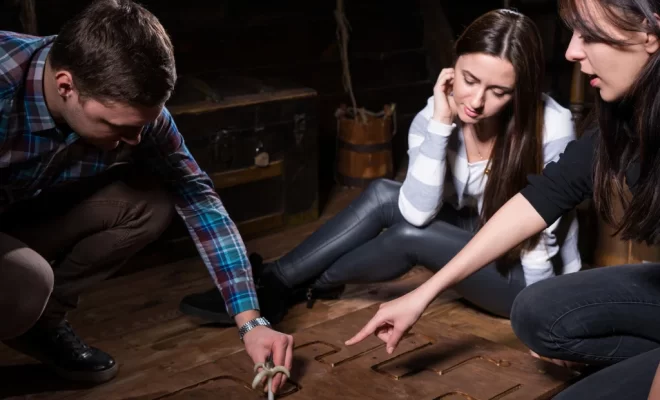Mastering Escape Rooms: A Strategic Approach

Escape rooms have become a popular form of entertainment, offering a thrilling challenge for individuals and groups alike. To increase your chances of success in these mind-bending puzzles, it’s essential to develop a strategic approach. By understanding the psychology of escape rooms, working effectively as a team, and employing various problem-solving techniques, you can unlock the secrets and emerge victorious.
The Mind Games: Psychological Tricks for Escape Room Success
Escape rooms often incorporate psychological elements to enhance the experience and challenge players. Understanding these tactics can help you stay calm, focused, and think critically. Common psychological techniques include:
Time Pressure:
The ticking clock creates a sense of urgency, which can lead to rushed decisions and overlook of crucial clues.
Fear and Anxiety:
Some escape rooms may incorporate elements of fear or suspense to heighten the experience. It’s important to manage these emotions and stay composed.
Misdirection:
Clues may be intentionally hidden or presented in a misleading way to test your problem-solving skills.
To counter these psychological tactics, practice mindfulness, deep breathing techniques, and effective time management. Trust your instincts and don’t be afraid to think outside the box.
Teamwork Makes the Dream Work: Essential Collaboration Strategies
Escape rooms are a team effort, and effective collaboration is crucial for success. Here are some essential strategies for working together:
Clear Communication:
Establish open and honest communication channels to share ideas, observations, and potential solutions.
Division of Labor:
Assign tasks based on individual strengths and interests to maximize efficiency.
Conflict Resolution:
Address disagreements calmly and respectfully to maintain a positive team dynamic.
Diverse Perspectives:
Encourage everyone to contribute their unique ideas and perspectives, as different viewpoints can lead to innovative solutions.
By working together as a cohesive unit, you can overcome challenges and unlock the secrets of the escape room.
The Art of Observation: Key Clues and Hidden Details
Escape rooms are filled with clues and hidden details that can lead to the solution. Developing keen observation skills is essential for success. Look closely at your surroundings, examine objects, and search for hidden messages or symbols. Pay attention to seemingly insignificant details, as they may hold the key to solving puzzles.
Cracking the Codes: Decoding Puzzles and Ciphers
Many escape rooms involve puzzles and ciphers that require logical thinking and problem-solving skills. Here are some common puzzle types and strategies:
Combination Locks:
Experiment with different combinations based on clues or observations.
Letter Codes:
Look for patterns, substitution ciphers, or common code types.
Number Sequences:
Identify numerical patterns, mathematical operations, or hidden meanings.
Mechanical Puzzles:
Examine the components and mechanisms to determine the correct sequence of actions.
The Physical Challenge: Overcoming Obstacles and Traps
Some escape rooms may incorporate physical challenges or traps. Building physical endurance and agility can be helpful, but it’s also important to use your problem-solving skills to overcome these obstacles. Work together as a team to identify solutions and avoid common pitfalls.
Technology and Tools: Using Gadgets to Your Advantage
While technology may not always be necessary, it can sometimes be helpful in solving puzzles or accessing hidden areas. Familiarize yourself with the tools provided and use them strategically to your advantage.
The Ultimate Escape Room Strategy Guide
To maximize your chances of success, combine these strategies and create a personalized escape room approach. Remember to stay calm, focused, and think critically. Trust your instincts, communicate effectively with your team, and don’t be afraid to experiment with different solutions.
Escape Room Myths and Misconceptions
There are many misconceptions surrounding escape rooms, which can lead to frustration and disappointment. Here are some common myths and the reality behind them:
Myth:
You need to be a genius to solve escape rooms.
Reality:
While intelligence can be helpful, many escape rooms require teamwork, observation, and problem-solving skills rather than advanced knowledge.
Myth:
Escape rooms are only for experienced players.
Reality:
Escape rooms are suitable for players of all ages and experience levels. Beginners can enjoy the challenge and learn new skills.
Myth:
You need to break things to solve puzzles.
Reality:
Most escape rooms involve non-destructive puzzles and challenges. Avoid damaging the room or its contents.
Myth:
You must complete the room in a certain amount of time.
Reality:
While time limits can add to the excitement, many escape rooms prioritize the enjoyment of the experience over strict time constraints.
Myth:
Escape rooms are always scary or intense.
Reality:
While some escape rooms may incorporate elements of suspense or fear, many others offer a more relaxed and enjoyable atmosphere.
By understanding these common misconceptions, you can set realistic expectations and avoid unnecessary frustration. Remember, the goal of escape rooms is to have fun and challenge your mind, not to stress yourself out.
The Future of Escape Rooms: Emerging Trends and Innovations
Escape rooms are constantly evolving, with new technologies and experiences emerging. Stay updated on the latest trends and innovations to enhance your enjoyment and success.
Mastering escape rooms requires a combination of strategic thinking, effective teamwork, and problem-solving skills. By understanding the psychology of escape rooms, working together as a cohesive unit, and employing various problem-solving techniques, you can significantly increase your chances of success.
Remember to experiment with different approaches, stay calm under pressure, and learn from your experiences. The enduring appeal of escape rooms lies in their ability to provide entertainment, challenge, and the satisfaction of overcoming obstacles. So, gather your team, put your thinking caps on, and embark on a thrilling escape room adventure!










